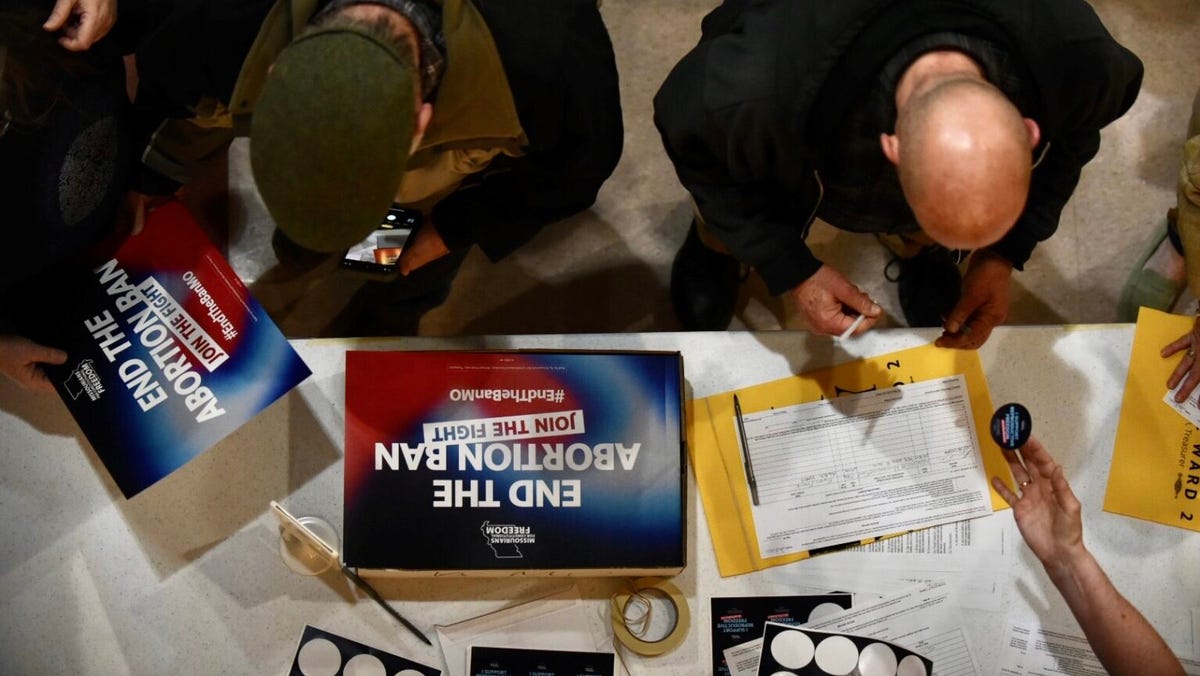New Hampshire
Strafford County, N.H., commissioners challenge newly drawn districts – The Boston Globe

Democrats tried but failed to undo HB 75 this year with a bill of their own. It was tabled then died late last month. Now the commissioners are urging the court to expedite their case and issue an order before the candidate filing period in June.
The new boundary lines slice through Strafford County’s two most populous cities, Dover and Rochester, and leave two of the incumbents together in the same district, so they won’t both be able to advance from the Democratic primary to the general election this fall.
George M. Maglaras, who is serving his 20th two-year term on the commission, said the changes were a ploy to ensure that not all the incumbents could win reelection.
“The gerrymandering was done on purpose. … It was designed to destroy the commission,” he said.
Maglaras joined with fellow incumbent commissioners Deanna S. Rollo and Robert J. Watson as plaintiffs in the suit filed Monday against New Hampshire Secretary of State David M. Scanlan and Attorney General John M. Formella.
A spokesperson for Scanlan referred questions Tuesday to Formella’s office, and a spokesperson for Formella said the attorney general’s office was reviewing the lawsuit but would not comment on pending litigation.
While Democrats have slammed HB 75 as a partisan power grab, the law’s proponents contend it corrected a problem and made election rules in Strafford County more closely resemble New Hampshire’s other nine counties, which already had commissioner districts.
Senator James P. Gray, a Republican from Rochester, rejected the notion that he or anyone else who supported HB 75 had done so with nefarious intent. This is about ensuring the voices of voters are heard, he said.
“The population of Strafford County is more concentrated in the southern part of the county, and right now that population does not share all of the political views of the people in the northern part of the county,” he said.
Some constituents had complained about their inability to get candidates elected who align with their views, so adding in the districts helps to further localize electoral representation, Gray said.
The three GOP candidates who ran in 2022 did not win a single seat, even though they carried about 41 percent of the countywide vote.
Republican Representative Len Turcotte of Barrington told his colleagues last June that HB 75 would put an end to a decades-long trend of “de facto gerrymandered elections” in Strafford County.
The debate over the merits of HB 75 as a tool to enhance representation might be irrelevant, however, to the outcome of this lawsuit. The central allegation in this case is procedural: The commissioners allege state lawmakers lacked authority to draw any new county commissioner districts in 2023 because such maps were already finalized in 2022 through the once-a-decade redistricting process.
“So that voters and elected officials may have stability and continuity in the electoral process, once a valid redistricting law has been enacted, the legislature cannot redistrict again until after the next census,” the plaintiffs’ attorney, William E. Christie, said in a statement.
Maglaras said HB 75 sets a terrible precedent that could unleash confusion and turmoil whenever legislative power in Concord shifts from one party to the other.
“It’s going to create chaos,” he said.
Gray said the concerns about HB 75 are misplaced. He contends lawmakers had every right to add districts where there had previously been none, and now that the districts are in place, they are locked in.
“I consulted several attorneys that said that ‘districting’ and ‘redistricting’ are separate things, and that it was perfectly legal to district an entity that had not been districted before,” he said.
“But now that it is districted, there would be a prohibition against redistricting it until the next census,” he added.
A spokesperson for House Speaker Sherman A. Packard said the legislature can propose to modify or repeal HB 75 like any other law, and the question of its constitutionality is now in the court’s hands.
County commissioners across New Hampshire are generally tasked with oversight of county government departments and budgetary matters. Some serve two-year terms. Others serve four-year terms that may be staggered.
While commissioners must live in the districts they represent, not all them are elected solely by the voters in their district — in Carroll and Sullivan counties, each district’s commissioner is picked through a countywide vote.
Steven Porter can be reached at steven.porter@globe.com. Follow him @reporterporter.

New Hampshire
Ex-teacher at NH youth facility testifies she reported suspicious bruises on at least half a dozen teens

A former teacher at New Hampshire’s youth detention center testified Monday that she reported suspicious bruises on at least half a dozen teenage boys in the 1990s, including the former resident who filed a landmark lawsuit against the state.
Brenda Wouters, who taught social studies at the Sununu Youth Services Center for 35 years, was the final witness called by David Meehan, who is seeking to hold the state accountable for physical, sexual and emotional abuse he says he suffered as a teen. Since he went to police in 2017, 11 former state workers have been arrested, and more than 1,100 former residents of the Manchester facility have filed lawsuits alleging six decades of abuse.
Wouters, who retired in 2022, said during the civil trial that she remembered Meehan growing sullen and withdrawn during his three years at what was then called the Youth Development Center. He had a black eye twice, she said. Another time, she asked him to lift up his shirt after she caught a glimpse of bruising and saw a “rainbow” of bruises along his torso.
TOP OFFICIALS AT NH DETENTION CENTER WOULDN’T TAKE CHILDREN’S WORD OVER STAFF, WITNESS CLAIMS
Other teens showed up to school with marks on their necks and arms, Wouters said. The whites of one boy’s eyes were “beet red,” she said.
“The reddest eyes I’ve ever seen short of watching a Dracula film,” she said.
Wouters also described teens telling her about being forced to fight. Staff pitted stronger kids against more fragile ones.
“Then they would encourage those kids to go ahead and fight with each other almost to the death until whomever was being the loser would then comply with whatever the staff wanted,” she said.
Wouters said when she approached residential staff, they brushed her off. She said she told her boss, and on multiple occasions, called the state Division of Children, Youth and Families, but there was no follow-up that she saw.
The Sununu Youth Services Center, in Manchester, N.H., stands among trees, Jan. 28, 2020. (AP Photo/Charles Krupa, File)
Under questioning from the state’s attorney, however, Wouters acknowledged that she never witnessed abuse, nor did she file any written complaints. Shown progress reports from the 1990s, she also acknowledged that Meehan was only in her class during the spring of 1996, a time when he does not allege abuse. But she said she would’ve still interacted with him after that.
Lawyers for the state will begin presenting their side on Tuesday, the trial’s 15th day. In opening arguments earlier this month, they argued the state is not liable for the actions of “rogue” employees, and in questioning Meehan’s witnesses, suggested he is lying to get money. The state also contends he waited too long to file his lawsuit. The statute of limitations for such lawsuits is three years from the date of injury, though there are exceptions in cases when victims were not aware of its link to the wrongful party.
After the jury was dismissed for the day Monday, Assistant Attorney General Brandon Chase asked the judge to issue a verdict in the state’s favor based on the statute of limitations argument.
Judge Andrew Schulman denied that request, saying the jury will decide. Though he said it might be a “close call” as to when Meehan realized as an adult he might have a claim against the state, he said it was unreasonable to believe he made that connection while at the facility or soon after. Schulman said when he visited the facility with jurors at the start of the trial, he spent some time in Meehan’s former room, looking out the window.
CLICK HERE TO GET THE FOX NEWS APP
“It occurred to me while I was there, this is the kid’s eye view,” he said. “You don’t have a very wide view of the world.”
New Hampshire
Violently Injured Police Officers Organization Co-Founder Testifies In Support of Bill in New Hampshire

CONCORD, N.H. — Mario Oliveira, co-founder of the Violently Injured Police Officers Organization (V.I.P.O.), testified last week before a committee of the New Hampshire House of Representatives in support of V.I.P.O.’s model bill to increase benefits for first responders who are seriously injured but not killed in the line of duty.
New Hampshire
The fraught path forward for cannabis legalization – NH Business Review

New Hampshire’s cannabis legalization effort has reached a tricky crossroads.
A year after Gov. Chris Sununu announced he would support a legalization approach that meets a number of strict conditions, the New Hampshire House has passed a bill. That bill, which cleared the House 239-136 last week, is now in the hands of the Senate.
But the governor has already raised issues with the bill, arguing that it does not follow his vision of establishing retail cannabis outlets that are state controlled.
Now, House Bill 1633 is in front of the Senate Judiciary Committee, and senators, House members, cannabis advocates, and representatives of the governor’s office are working to find a compromise that might please all sides, and not fall afoul of federal laws.
Here’s the latest on the state of cannabis legalization.
Sununu’s position
After years of wavering between skepticism and outright opposition to cannabis legalization in New Hampshire, Sununu surprised many in May 2023 when he released a statement saying he would sign a legalization bill if it met certain criteria.
In order to win Sununu’s support, the bill would need to include a retail model that allowed legal sales only at specific outlets overseen by the state, the governor stated. That approach would include measures to keep cannabis outlets away from schools; prohibit “marijuana miles,” or areas where cannabis stores are concentrated; allow towns to decide whether to permit a cannabis outlet; and provide state control over marketing, messaging, distribution, and access.
Some legalization advocates have opposed that approach, seeing it as unnecessary interference with the free market that would keep costs high.
What has the House done?
The House has passed a number of versions of the cannabis legalization bill this term, as lawmakers quarrel over how closely to adhere to Sununu’s vision.
The legislation that left the House last week, HB 1633, would allow the state to license up to 15 retail establishments. The 43-page bill would legalize the use and purchase of cannabis for anyone 21 or older, and create a commission to license and regulate retail outlets.
Sununu’s issue arises from how those outlets would be managed by the state. The House has adopted a licensing model. The governor prefers a franchise model, which would allow the state to dictate the marketing, layout, and appearance of the cannabis outlets, similar to how fast-food companies allow people to open franchises but require that stores follow brand guidelines.
“The state would essentially be an operational partner, like McDonald’s to a McDonald’s franchise,” said Karen O’Keefe, director of state policies for the Marijuana Policy Project, an advocacy organization.
To Sununu, the retail license model doesn’t give the state sufficient control over sales.
“Governor Sununu has been crystal clear about the framework needed for a legalization bill to earn his support, focusing on harm reduction and keeping it out of kids’ hands,” the governor’s office said in a statement last week. “The legislation passed today doesn’t get us there but the Governor looks forward to working with the Senate to see if we can get it done.”
Why did the House deviate from Sununu’s position?
To some House lawmakers and cannabis legalization advocates, the question of whether to adopt a franchise or license model is not academic: It could have real legal implications for the state.
“Here we are in the world of cannabis, where everything is changing federally under our feet as we try to legalize it here in New Hampshire,” said Tim Egan, an advocate representing the New Hampshire Cannabis Association.
The U.S. Federal Trade Commission has regulatory power over franchised businesses, and requires a certain level of disclosure by companies that are selling franchise rights to others in order to prevent unfair practices.
While 24 states have legalized cannabis, New Hampshire’s state-run retail system would be a first in the U.S. That lack of precedent has made some legalization supporters concerned that a franchise model could allow the FTC to step in and shut down the state-run stores, given that cannabis is still illegal under federal law. Concerns over state liability have pushed some to argue that the licensee model is better.
“Early on, people that knew something about franchise law said, ‘Just don’t do this; you can’t do this,’” said John Reagan, a former Republican state senator from Deerfield who now lobbies in favor of legalization. “You’ll be in a paralyzed situation, and won’t be able to get anything done.”
Others have raised concerns about how close the franchise model could put the state to the cannabis sales themselves. That could raise the possibility for lawsuits, O’Keefe said. The state could potentially face a lawsuit under the Racketeer Influenced and Corrupt Organizations Act (RICO), under the premise that it is engaged in sales of an illegal drug. Or it could face litigation over the “impossibility pre-emption,” the doctrine that prevents an employee from needing to follow both a state law and a federal law if the two conflict.
Meanwhile, many states that have legalized have already faced difficulty navigating how to collect revenue from retail sales without falling afoul of banking regulations. New Hampshire’s franchise model could invite similar headaches, Egan said.
What’s next for the bill?
HB 1633 has arrived at the Senate Judiciary Committee, which is holding a hearing on April 25. But even before the committee takes it up publicly, stakeholders and senators are already meeting to attempt to finesse the bill to Sununu’s liking.
To be successful, senators will need to thread a needle: Tweak the House bill just enough to win the governor over, but not so much that it transforms the state model and loses support in the House. If the Senate passes a bill that the House does not immediately accept, it could go to a committee of conference, which advocates worry could doom its chances.
Amid those stakes, a potential compromise to the bill has emerged, Egan and O’Keefe say. The proposal would create the franchise model the governor asked for, but include a trigger clause that would implement the licensee approach should the franchise approach be struck down in court. That could allow the state to carry on retail sales even if the federal government intervened.
“I think that would be a great way to bridge the gap,” O’Keefe said. “If (the governor) thinks the franchise model is going to work, then if it works, it works. But if it doesn’t work, then you can address the House’s concerns there.”
For now, discussions are ongoing with Sens. Daryl Abbas, Becky Whitley, Cindy Rosenwald, Tim Lang, and Rep. Erica Layon, according to Egan.
Legalization supporters have attempted a variety of legislative models over the past decade, only to see them struck down by the Senate. But for advocates, with Sununu declining to run for reelection, legalization could be now or never.
“If the goal is to get it done, this is the window,” said O’Keefe. “There is no guarantee that next year there will be a governor that will sign any bill.”
This story was originally produced by the New Hampshire Bulletin, an independent local newsroom that allows NH Business Review and other outlets to republish its reporting.
-

 World1 week ago
World1 week agoShipping firms plead for UN help amid escalating Middle East conflict
-

 Politics1 week ago
Politics1 week agoICE chief says this foreign adversary isn’t taking back its illegal immigrants
-

 Politics1 week ago
Politics1 week ago'Nothing more backwards' than US funding Ukraine border security but not our own, conservatives say
-

 News1 week ago
News1 week agoThe San Francisco Zoo will receive a pair of pandas from China
-

 World1 week ago
World1 week agoBrussels, my love? The EU single market is not sexy enough for voters
-

 World1 week ago
World1 week agoEU sanctions extremist Israeli settlers over violence in the West Bank
-

 Education1 week ago
Education1 week agoVideo: Dozens of Yale Students Arrested as Campus Protests Spread
-

 Politics1 week ago
Politics1 week agoDemocrats hold major 2024 advantage as House Republicans face further chaos, division



















